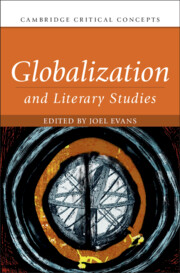Book contents
- Globalization and Literary Studies
- Cambridge Critical Concepts
- Globalization and Literary Studies
- Copyright page
- Contents
- Figures
- Tables
- Contributors
- Acknowledgements
- Introduction
- Part I Origins
- Part II Development
- Part III Application
- Chapter 15 The Globalization of the Enclave
- Chapter 16 Geopolitics and the Novel
- Chapter 17 Spy Fiction in the Age of the Global
- Chapter 18 The Twenty-First-Century Global Slave Narrative Trade
- Chapter 19 Planetary Poetics
- Chapter 20 Addressing Globalization in the Anthropocene
- References
- Index
Chapter 15 - The Globalization of the Enclave
from Part III - Application
Published online by Cambridge University Press: 01 April 2022
- Globalization and Literary Studies
- Cambridge Critical Concepts
- Globalization and Literary Studies
- Copyright page
- Contents
- Figures
- Tables
- Contributors
- Acknowledgements
- Introduction
- Part I Origins
- Part II Development
- Part III Application
- Chapter 15 The Globalization of the Enclave
- Chapter 16 Geopolitics and the Novel
- Chapter 17 Spy Fiction in the Age of the Global
- Chapter 18 The Twenty-First-Century Global Slave Narrative Trade
- Chapter 19 Planetary Poetics
- Chapter 20 Addressing Globalization in the Anthropocene
- References
- Index
Summary
This chapter begins from the historical conjecture that, at the level of social and political geography, globalization is best defined by the practical and symbolic parcellisation of social and political space, not through metaphors of borderlessness. Such parcellisation is epitomised by the proliferation of actual enclaves zones such as business parks, gated communities, refugee camps and export processing zones. They also have their fantasy versions, such as the so-called No-Go Zones that, political activists and commenters have alleged, represent areas of effective Muslim secession from secular states such as Britain and France. The chapter considers empirical and theoretical evidence for the break-up of global social space. It concludes by showing how these spaces become important formal and thematic topoi in contemporary literary works by J. G. Ballard, Ali Smith and Caryl Phillips. Other authors discussed include John Berger and Joseph O’Neill.
Keywords
- Type
- Chapter
- Information
- Globalization and Literary Studies , pp. 247 - 261Publisher: Cambridge University PressPrint publication year: 2022

